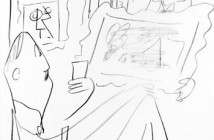Have you ever wondered how the gallery business works? Are you an artist who wants to sell your work, but have questions or concerns? Are you a collector looking for the best deals?
Our anonymous art dealer has advice for you. This first installment features general questions encountered by gallerists, and our AAD is waiting for your questions: advice@bigredandshiny.com
Q: How do galleries make money?
A: I was surprised entering this business how many people asked me this same question. Typically, a gallery will take 50% of any sales made. This may vary 10% in either direction depending on the gallery. Often times, non-profit spaces or galleries featuring group shows may only ask for 25%. Generally, an artist should expect to make only half of what they would selling their work out of their own studio. The exposure, representation and promotion that a gallery provides is probably worth it. As an artist, you should think of yourself as a business, and giving up half of your profit to a gallery should be considered the “cost of doing business.”
Q: I am a young artist represented by a gallery in Boston. Recently another gallery has contacted me, wanting to put some work into a group show. What should I do?
A: Because you are showing consistently in one gallery doesn’t mean that you shouldn’t be allowed to show your work in another. Your gallery should be excited by the prospect as it will bring you more exposure, which is good for everyone.
But, you should discuss this scenario with your gallery prior to responding to the request. Then, I would tell the second gallery that you are interested in working together and to contact your main gallery to arrange it. It is likely that the two galleries will come to an agreement on splitting the gallery commission should there be a sale. These splits are common, and will vary. Regardless of how the galleries establish their commissions you should always expect at least 50% of any sale.
Q: What’s the best way to approach a gallery for an exhibition?
A: The worse thing that you can do is send artwork to a gallery that you’ve never been to. As a gallery owner, I received several submissions each week, most of which was a different style, technique or medium than what I chose to exhibit. So, like in many other professions, you must do research. When you are touring a city, visit as many galleries as you can. Get a feel for the work that they show and have shown in the past. If you think that your work suites a particular gallery, let a director know that your work would be a good fit and you would like to know their procedures for reviewing work.
Once you have directions for submitting the work, follow them carefully. Make sure you know whether they prefer slide, print or digital submissions. Include a letter reminding the director that you had stopped in. Lastly, don’t make your portfolio too fancy. The presentation should be nice and well thought out, but refrain from sending handmade books or original art pieces.
Q: Recently my gallery sold a painting of mine at a discount, and I made a lot less money than I had expected. Is this normal?
A: Discounts are very common in the gallery business. Collectors, consultants, dealers and curators often receive discounts. Actually, anyone purchasing and art piece is entitled to ask the dealer if the price listed is actually “the best price.”
Certain galleries have different policies on discounts and it is important to discuss them early in your relationship. Generally, an artist should be willing to sell an artwork for 10% less than the original retail price. This allows the dealer to be flexible with the price should someone be interested and ask for a discount. For example: if you are selling a painting for $1000 and the dealer gives a 10% discount, the final sale price will be $900. If you have a 50/50 arrangement with your gallery, you will be paid $450.
However, as an artist, I would make sure that you are not obligated to share a discount beyond 10%. If a dealer wants to discount beyond 10% (dealers often give 25% discounts to consultants), the dealer should take the discount out of their commission, not yours.
 "Advice For Artists" can be read in series in
"Advice For Artists" can be read in series in
the Big RED & Shiny Collections section.





